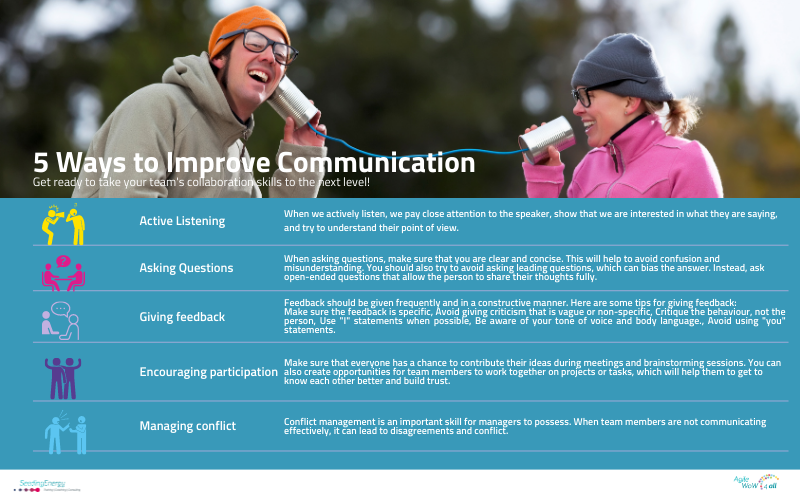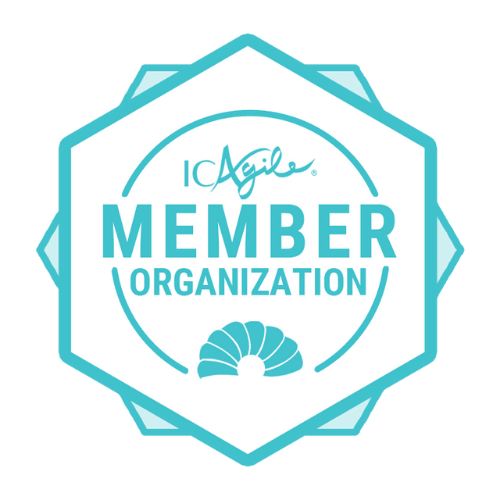Christophe Martinot
5 Ways to Improve Communication Within Your Team: Management 3.0 Practices
Communication is the key to successful teamwork, but it's often easier said than done. With remote work becoming more common and communication barriers popping up left and right, how can you ensure that your team stays connected and productive?
Fear not! In this blog post, we'll explore 5 effective ways to improve communication within your team using Management 3.0 practices. From gamification to feedback loops, get ready to take your team's collaboration skills to the next level!
Fear not! In this blog post, we'll explore 5 effective ways to improve communication within your team using Management 3.0 practices. From gamification to feedback loops, get ready to take your team's collaboration skills to the next level!
The need for communication
There are many reasons why effective communication is essential within a team. First and foremost, it allows members to coordinate their efforts and work together towards a common goal. Secondly, good communication can help to build trust and foster positive relationships between team members. Finally, clear and concise communication can help to avoid misunderstandings and conflict.
There are a number of ways that managers can improve communication within their team. One way is to ensure that there are regular opportunities for team members to communicate with one another, such as through regular meetings or catch-ups. Another way is to encourage open and honest communication by creating an environment where everyone feels comfortable sharing their thoughts and ideas. Finally, it is important to provide clear instructions and expectations so that everyone is on the same page from the start.
By following these simple tips, you can encourage better communication within your team and create an environment where everyone can thrive.
1. Active listening
Active listening is a key communication skill that all managers should master. When we actively listen, we pay close attention to the speaker, show that we are interested in what they are saying, and try to understand their point of view. This type of listening can help build trust and rapport within your team, and can also lead to more productive conversations.
There are a few things you can do to become a better active listener:
- Pay attention to body language: Body language can be just as important as the words we use when communicating. If you're not paying attention to the speaker's body language, you may miss important cues about how they're feeling.
- Repeat back what you've heard.
There are a few things you can do to become a better active listener:
- Pay attention to body language: Body language can be just as important as the words we use when communicating. If you're not paying attention to the speaker's body language, you may miss important cues about how they're feeling.
- Repeat back what you've heard.
If you're not sure if you understand what the speaker is saying, try repeating back what you've heard in your own words. This will let them know that you're trying to understand them, and it will also help clarify any misunderstandings.
- Ask questions for clarification.
Asking questions is a great way to show that you're interested in what the other person is saying. It's also an opportunity to get clarification on anything that you might have missed or misunderstood.
2. Asking questions
The most important thing you can do to improve communication within your team is to ask questions. By asking questions, you show that you are interested in what others have to say and that you value their input. It also allows you to get a better understanding of the situation and to find out what people really think.
When asking questions, make sure that you are clear and concise. This will help to avoid confusion and misunderstanding. You should also try to avoid asking leading questions, which can bias the answer. Instead, ask open-ended questions that allow the person to share their thoughts fully.
Finally, don’t forget to listen to the answers! Active listening is key to effective communication. Pay attention to what the other person is saying and try to understand their point of view. If you have any clarification questions, make sure to ask them.
3. Giving feedback
Giving feedback is one of the most important aspects of communication within a team. Feedback should be given frequently and in a constructive manner. Here are some tips for giving feedback:
- Make sure the feedback is specific.
- Avoid giving criticism that is vague or non-specific.
- Critique the behaviour, not the person.
- Use "I" statements when possible.
- Be aware of your tone of voice and body language.
- Avoid using "you" statements.

4. Encouraging participation
It is important to encourage participation from all team members in order to improve communication within your team. One way to do this is to make sure that everyone has a chance to contribute their ideas during meetings and brainstorming sessions. You can also create opportunities for team members to work together on projects or tasks, which will help them to get to know each other better and build trust. Additionally, encouraging informal communication and socializing outside of work can help team members feel more comfortable communicating with each other.
Finally, you should make sure that team members are recognized for their efforts and contributions. This can be done through public recognition, such as awarding a team member of the month or sending out emails thanking individuals for their hard work. These small gestures can go a long way in encouraging participation and creating a positive team atmosphere.
5. Managing conflict
When it comes to communication within a team, conflict management is an important skill for managers to possess. When team members are not communicating effectively, it can lead to disagreements and conflict.
Managers need to be able to identify when there is a communication problem within the team and then take steps to address the issue. One way to do this is by holding regular team meetings where everyone has a chance to share their thoughts and ideas openly. This can help to identify any areas of disagreement so that they can be addressed before they escalate into a full-blown argument.
Another way to manage conflict is by encouraging open communication between team members. This means creating an environment where people feel comfortable sharing their opinions and ideas, even if they differ from others on the team. Encouraging open communication can help prevent misunderstandings and miscommunication from occurring, which can lead to conflict.
If conflict does occur, it’s important for managers to step in and mediate the situation. By doing so, they can help resolve the issue and get the team back on track.
Communication is key for the success of any team, and without it, teams can quickly become bogged down. Our 5 Ways to Improve Communication Within Your Team through Management 3.0 Practices is a great starting point for improving communication within your team and creating an environment that allows everyone to thrive together. By utilizing these practices, you are one step closer to building a unified and successful team.
Should you be interested in learning the Management 3.0 practices, check out our Management 3.0 workshops.
Thank you!
AgileWoW4all is a brand of SeedingEnregy S.L.
At SeedingEnergy we want to unleash the potential of your team and reach new goals through facilitation, customized trainings and coaching.
Copyright SeedingEnergy© 2021
Write your awesome label here.
¿Estás preparado?
Sé el primero en aportar innovación en tu departamento de Marketing
Thank you!




